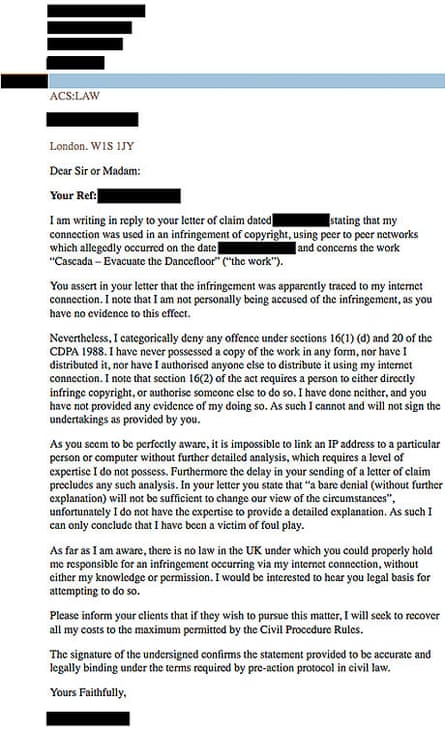Hundreds of UK broadband users accused of sharing copyrighted content are preparing for the prospect of coordinated legal action against ACS:Law, the controversial solicitors' firm at the centre of a huge row over file sharing and leaked data.
Those contemplating the action claim to have been wrongly identified as breaking the law, insisting that the methodology behind identifying illegal file sharers is deeply flawed and the pursuit of alleged file sharers classifies as harassment. ACS:Law and other lawyers chasing the accused insist the methodology is sound. Not so, rings the cry from just about everyone else.
A recap. Private information about thousands of broadband users held by ACS:Law spilt out onto the web last week. The data, obtained through court orders to internet service providers, was leaked online in the aftermath of a "denial of service" attack on the website of ACS:Law. An investigation by the Information Commissioner will establish whether or not the data was held in a secure, encrypted format – if not, the company could face a fine of up to £500,000. The ISPs involved – BT-owned Plusnet, O2-owned Be Broadband, and BSkyB – have joined Virgin Media and TalkTalk in saying that they will challenge court orders brought by the company until it can prove the security of its data handling. Quite a mess – yet the court orders live on. Two fresh developments as of Monday afternoon:
BT said it will ask for an adjournment at the 3pm court hearing at which Gallant Macmillan, acting on behalf of Minstry of Sound, is seeking a court order to obtain personal details of hundreds of Plusnet customers. 4.55pm: BT had its adjournment in the hearing of Ministry of Sound vs. Plusnet granted. See this story for more details.
Before the hearing, BT told the Guardian:
"We will be asking the court to adjourn to a later date to give the opportunity, and enough time, for the serious issues raised to be properly considered. The incident involving the ACS:Law data leak has damaged people's confidence in the current process. It's in everyone's interests to repair this and to ensure that broadband users' interests are safeguarded – we are determined to do this. We are actively reviewing our approach to these disclosure requests to achieve this objective."
Zen Internet, one of the internet service providers issued with court orders brought by ACS:Law, has said it will not provide any customer information to them until it is satisfied that data is being held securely. Zen Internet told the Guardian:
"We are aware of the recent media interest in ACS Law and as a result have investigated the situation thoroughly. Following our investigation and after speaking directly to ACS:Law we understand that no personal information about Zen customers to date has been leaked or published. We have received court orders from ACS:Law but will not provide any customer account holder information to them until we are satisfied that their systems are secure and our data will be protected in accordance with all relevant laws."
"We don't even like dance music – we're rock fans..."
In the document embedded below, a broadband user is accused of sharing the copyrighted work of music artist Cascada on a peer-to-peer network, a claim the recipient strongly denies. Speaking to the Guardian on condition of anonymity, the accused said: "I find it amazing that the UK finds itself in a situation where it is considered justifiable for a solicitor and his company to bring great distress and worry on people, myself and my family included.
"Their accusations are based only on evidence that ACS:Law collects and to which there is no real method of proving one's innocence. ACS:Law act as investigator, judge and jury without any regard for who their actions affect."
(A 67-year-old church elder was similarly featured in today's Metro having being accused of illegally downloading the Cascada dance tune. "At the time I was supposed to be committing this offence on my computer in Scotland, I was actually in Dorset putting my mother into a care home," he said.)
In this case, the accused duly writes back to ACS:Law, denying the claim:

But the solicitors' firm isn't impressed, claiming the wording of the response has been "matches a template response that is available on the internet" and therefore: "we are disinclined to accept at face value what you have said".
"These people are extremely distressed"
Michael Forrester, of Manchester-based Ralli solicitors, is involved in assessing the claims of more than 200 people who say that ACS:Law's pursuit of them was harassment. "These people are extremely distressed," he said. "People have told us of fights between partners, numerous sleepless nights, and visits to their GPs because of the stress. We have been informed that even though people have explained how it cannot possibly be them, they are often still pursued.
"Many people are so embarrassed just telling us about files they are alleged to have downloaded and shared, I cannot see them wanting to draw further attention to the issue if they were not innocent".
Would ACS:Law's evidence stand up in court?
Only a handful of the cases brought by ACS:Law have made it to court, despite the company sending thousands of letters. The company uses technology from a third party firm to get hold of the IP address – rather than the physical addresss – of people it suspects of file sharing copyrighted content, then applies for a court order requiring the relevant broadband provider to hand over customer information including names and addresses.
It is then incumbent on the rights holder to prove that a named individual shared the copyrighted content at a specific date and time, breaking the law as set out in the Copyright & Patents Act (1988). But pinning the identification down to a named individual is tricky, given that an IP address identifies only the connection at which the computer connects to the internet. However, because it would be a civil case, the standard of proof would be the "balance of evidence" – rather than "guilt beyond reasonable doubt" as in a criminal case.
"We entirely support the need for copyright owners to enforce their rights. We are often instructed by rights holders who wish us to assist them protecting their works," Forrester says. "However, the current system is fraught with problems.
"Dependence on an IP addresses to target infringers appears to cause many false positive identifications, as the current situation seems to highlight. The vast majority of the people who had contacted us say they are entirely innocent of downloading the material alleged and believe they have cogent arguments to support this."
Sarah Byrt, partner at law firm Mayer Brown LLP, added: "Once you've got the data about who the users are, you need technical evidence, for example by looking at people's PC hard drives to see what sites they've been on and what files they've copied."
An issue that will surely be swept away with the torrent of technology news? Don't count on it. At 3pm, chief master Winegarton will choose whether or not to grant a court order brought by solicitors Gallant Macmillan acting for Ministry of Sound relating to hundreds of Plusnet customers the firm suspects of illegal file sharing – and one which BT has already challenged. Hold on to your hats.





Comments (…)
Sign in or create your Guardian account to join the discussion